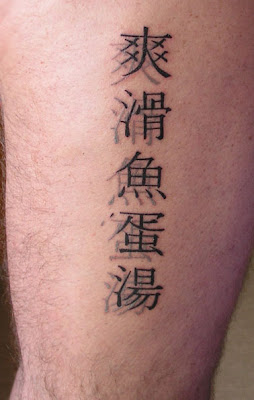Kanji tattoo designs come from a Japanese script, originating within Chinese characters. Kanji tattoos in essence, are ideograms depicting abstract ideas such as spirit, belief, love, loyalty, trust or the conveyance of any individual significance. In the ongoing spirit of competition, some tattoo bearers and artists alike, envelope their characters with various pictures to round out the tattoo.
 |
| Japanese Kanji Tattoo |
Whether looking to write a special name or to revere particular scenery, Kanji tattoos have one intention - to make a statement even if shrouded in mystery. The objective is to gain attention and ask questions, perhaps an icebreaker in conversation with strangers.
 |
| Japanese Back Kanji Tattoo |
The script of Kanji has given rise to prominence to both Japanese and Chinese linguistics among admirers of tattoo art. However, those who engrave their bodies with the script, at times lack real reverence for such complex language and culture. It is worth understanding a thing or two about the script and the culture before inking your body with characters that mean something far different from what you intended.
 |
| Japanese Kanji Tattoo for women |
Kanji tattoo designs rely on the characters being correctly oriented to convey specific meaning, and it is worth noting that Kanji is not a proper interpretation of script for writing foreign names. Translating an English name to Kanji may yield a translation, but the translation will be superficial, rather than accurate.
 |
| Japanese Kanji Tattoo for men |
You should also keep in mind that in Japan, the culture is such that the typical Japanese do not share the same fondness for tattoos. Tattoos are usually associated with a shadowy group of characters known as the Yakuza, or Japanese mafia. If you ever visit Japan, you will notice that most bath houses forbid entrance by those showing tattoos. This is the polite, non-confrontational way of conveying that the Yakuza are not welcome on the premises.









.gif)
.jpeg)
Post a Comment